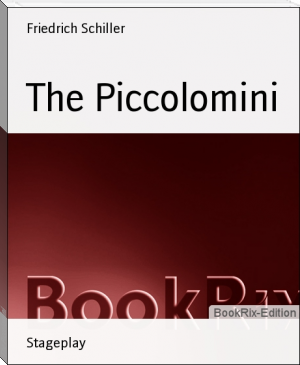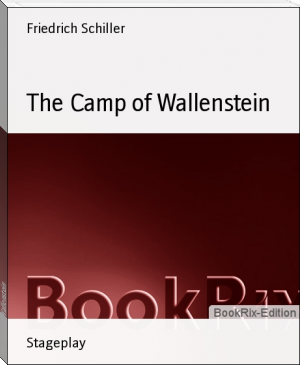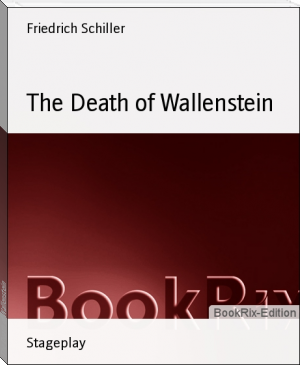The Piccolomini by Friedrich Schiller (summer reads TXT) 📖

- Author: Friedrich Schiller
Book online «The Piccolomini by Friedrich Schiller (summer reads TXT) 📖». Author Friedrich Schiller
[He walks across the chamber, then returns, and standing still, proceeds.
The heavenly constellations make not merely The day and nights, summer and spring, not merely Signify to the husbandman the seasons Of sowing and of harvest. Human action, That is the seed, too, of contingencies, Strewed on the dark land of futurity In hopes to reconcile the powers of fate Whence it behoves us to seek out the seed-time, To watch the stars, select their proper hours, And trace with searching eye the heavenly houses, Whether the enemy of growth and thriving Hide himself not, malignant, in his corner. Therefore permit me my own time. Meanwhile Do you your part. As yet I cannot say What I shall do--only, give way I will not, Depose me, too, they shall not. On these points You may rely.
PAGE (entering).
My lords, the generals.
WALLENSTEIN. Let them come in.
TERZKY.
Shall all the chiefs be present?
WALLENSTEIN. 'Twere needless. Both the Piccolomini Maradas, Butler, Forgoetsch, Deodati, Karaffa, Isolani--these may come.
[TERZKY goes out with the PAGE.
WALLENSTEIN (to ILLO). Hast thou taken heed that Questenberg was watched? Had he no means of secret intercourse?
ILLO. I have watched him closely--and he spoke with none But with Octavio.
SCENE VII.
WALLENSTRIN, TERZKY, ILLO.--To them enter QUESTENBERG, OCTAVIO,
and MAX. PICCOLOMINI, BUTLER, ISOLANI, MARADAS, and three other
Generals. WALLENSTEIN Motions QUESTENBERG, who in consequence
takes the chair directly opposite to him; the others follow,
arranging themselves according to their rank. There reigns a
momentary silence.
WALLENSTEIN.
I have understood, 'Tis true, the sum and import, Questenberg, Of your instructions. I have weighed them well, And formed my final, absolute resolve; Yet it seems fitting that the generals Should hear the will of the emperor from your mouth. May it please you then to open your commission Before these noble chieftains?
QUESTENBERG.
I am ready To obey you; but will first entreat your highness, And all these noble chieftains, to consider, The imperial dignity and sovereign right Speaks from my mouth, and not my own presumption.
WALLENSTEIN. We excuse all preface.
QUESTENBERG.
When his majesty The emperor to his courageous armies Presented in the person of Duke Friedland A most experienced and renowned commander, He did it in glad hope and confidence To give thereby to the fortune of the war A rapid and auspicious change. The onset Was favorable to his royal wishes. Bohemia was delivered from the Saxons, The Swede's career of conquest checked! These lands Began to draw breath freely, as Duke Friedland From all the streams of Germany forced hither The scattered armies of the enemy; Hither invoked as round one magic circle The Rhinegrave, Bernhard, Banner, Oxenstiern, Yea, and the never-conquered king himself; Here finally, before the eye of Nuernberg, The fearful game of battle to decide.
WALLENSTEIN. To the point, so please you.
QUESTENBERG.
A new spirit At once proclaimed to us the new commander. No longer strove blind rage with rage more blind; But in the enlightened field of skill was shown How fortitude can triumph over boldness, And scientific art outweary courage. In vain they tempt him to the fight. He only Entrenches him still deeper in his hold, As if to build an everlasting fortress. At length grown desperate, now, the king resolves To storm the camp and lead his wasted legions, Who daily fall by famine and by plague, To quicker deaths and hunger and disease. Through lines of barricades behind whose fence Death lurks within a thousand mouths of fire, He yet unconquered strives to storm his way. There was attack, and there resistance, such As mortal eye had never seen before; Repulsed at last, the king withdrew his troops From this so murderous field, and not a foot Of ground was gained by all that fearful slaughter.
WALLENSTEIN. Pray spare us these recitals from gazettes, Which we ourselves beheld with deepest horror.
QUESTENBERG. In Nuernberg's camp the Swedish monarch left His fame--in Luetzen's plains his life. But who Stood not astounded, when victorious Friedland After this day of triumph, this proud day, Marched toward Bohemia with the speed of flight, And vanished from the theatre of war? While the young Weimar hero [7] forced his way Into Franconia, to the Danube, like Some delving winter-stream, which, where it rushes, Makes its own channel; with such sudden speed He marched, and now at once 'fore Regensburg Stood to the affright of all good Catholic Christians. Then did Bavaria's well-deserving prince Entreat swift aidance in his extreme need; The emperor sends seven horsemen to Duke Friedland, Seven horsemen couriers sends he with the entreaty He superadds his own, and supplicates Where as the sovereign lord he can command. In vain his supplication! At this moment The duke hears only his old hate and grudge, Barters the general good to gratify Private revenge--and so falls Regensburg.
WALLENSTEIN. Max., to what period of the war alludes he? My recollection fails me here.
MAX.
He means When we were in Silesia.
WALLENSTEIN.
Ay! is it so! But what had we to do there?
MAX.
To beat out The Swedes and Saxons from the province.
WALLENSTEIN.
True; In that description which the minister gave, I seemed to have forgotten the whole war.
[TO QUESTENBERG. Well, but proceed a little.
QUESTENBERG. We hoped upon the Oder to regain What on the Danube shamefully was lost. We looked for deeds of all-astounding grandeur Upon a theatre of war, on which A Friedland led in person to the field, And the famed rival of the great Gustavus Had but a Thurn and Arnheim to oppose him! Yet the encounter of their mighty hosts Served but to feast and entertain each other. Our country groaned beneath the woes of war, Yet naught but peace prevailed in Friedland's camp!
WALLENSTEIN. Full many a bloody strife is fought in vain, Because its youthful general needs a victory. But 'tis the privilege of the old commander To spare the costs of fighting useless battles Merely to show that he knows how to conquer. It would have little helped my fame to boast Of conquest o'er an Arnheim; but far more Would my forbearance have availed my country, Had I succeeded to dissolve the alliance Existing 'twixt the Saxon and the Swede.
QUESTENBERG. But you did not succeed, and so commenced The fearful strife anew. And here at length, Beside the river Oder did the duke Assert his ancient fame. Upon the fields Of Steinau did the Swedes lay down their arms, Subdued without a blow. And here, with others, The righteousness of heaven to his avenger Delivered that long-practised stirrer-up Of insurrection, that curse-laden torch And kindler of this war, Matthias Thurn. But he had fallen into magnanimous hands Instead of punishment he found reward, And with rich presents did the duke dismiss The arch-foe of his emperor.
WALLENSTEIN (laughs).
I know, I know you had already in Vienna Your windows and your balconies forestalled To see him on the executioner's cart. I might have lost the battle, lost it too With infamy, and still retained your graces-- But, to have cheated them of a spectacle, Oh! that the good folks of Vienna never, No, never can forgive me!
QUESTENBERG.
So Silesia Was freed, and all things loudly called the duke Into Bavaria, now pressed hard on all sides. And he did put his troops in motion: slowly, Quite at his ease, and by the longest road He traverses Bohemia; but ere ever He hath once seen the enemy, faces round, Breaks up the march, and takes to winter-quarters.
WALLENSTEIN. The troops were pitiably destitute Of every necessary, every comfort, The winter came. What thinks his majesty His troops are made of? Aren't we men; subjected Like other men to wet, and cold, and all The circumstances of necessity? Oh, miserable lot of the poor soldier! Wherever he comes in all flee before him, And when he goes away the general curse Follows him on his route. All must be seized. Nothing is given him. And compelled to seize From every man he's every man's abhorrence. Behold, here stand my generals. Karaffa! Count Deodati! Butler! Tell this man How long the soldier's pay is in arrears.
BUTLER. Already a full year.
WALLENSTEIN.
And 'tis the hire That constitutes the hireling's name and duties, The soldier's pay is the soldier's covenant. [8]
QUESTENBERG. Ah! this is a far other tone from that In which the duke spoke eight, nine years ago.
WALLENSTEIN. Yes! 'tis my fault, I know it: I myself Have spoilt the emperor by indulging him. Nine years ago, during the Danish war, I raised him up a force, a mighty force, Forty or fifty thousand men, that cost him Of his own purse no doit. Through Saxony The fury goddess of the war marched on, E'en to the surf-rocks of the Baltic, bearing The terrors of his name. That was a time! In the whole imperial realm no name like mine Honored with festival and celebration-- And Albrecht Wallenstein, it was the title Of the third jewel in his crown! But at the Diet, when the princes met At Regensburg, there, there the whole broke out, There 'twas laid open, there it was made known Out of what money-bag I had paid the host, And what were now my thanks, what had I now That I, a faithful servant of the sovereign, Had loaded on myself the people's curses, And let the princes of the empire pay The expenses of this war that aggrandizes The emperor alone. What thanks had I? What? I was offered up to their complaint Dismissed, degraded!
QUESTENBERG.
But your highness knows What little freedom he possessed of action In that disastrous Diet.
WALLENSTEIN.
Death and hell! I had that which could have procured him freedom No! since 'twas proved so inauspicious to me To serve the emperor at the empire's cost, I have been taught far other trains of thinking Of the empire and the Diet of the empire. From the emperor, doubtless, I received this staff, But now I hold it as the empire's general,-- For the common weal, the universal interest, And no more for that one man's
 In literature a drama genre deserves your attention. Dramas are usually called plays. Every person is made up of two parts: good and evil. Due to life circumstances, the human reveals one or another side of his nature. In drama we can see the full range of emotions : it can be love, jealousy, hatred, fear, etc. The best drama books are full of dialogue. This type of drama is one of the oldest forms of storytelling and has existed almost since the beginning of humanity. Drama genre - these are events that involve a lot of people. People most often suffer in this genre, because they are selfish. People always think to themselves first, they want have a benefit.
In literature a drama genre deserves your attention. Dramas are usually called plays. Every person is made up of two parts: good and evil. Due to life circumstances, the human reveals one or another side of his nature. In drama we can see the full range of emotions : it can be love, jealousy, hatred, fear, etc. The best drama books are full of dialogue. This type of drama is one of the oldest forms of storytelling and has existed almost since the beginning of humanity. Drama genre - these are events that involve a lot of people. People most often suffer in this genre, because they are selfish. People always think to themselves first, they want have a benefit.




Comments (0)